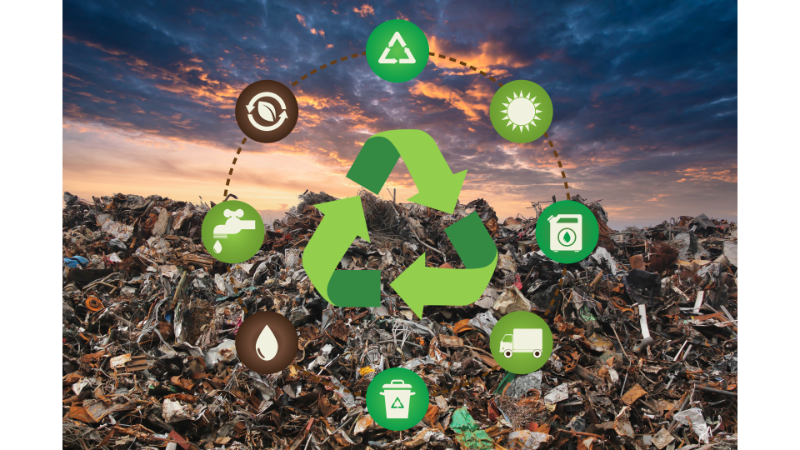The benefits of recycling have become more important than ever in today’s world, where environmental awareness is rapidly increasing. Recycling activities are not only an individual responsibility but also recognized as a global social necessity. In the face of global problems such as the rapid depletion of natural resources, increasing waste volumes, environmental pollution, and climate change, recycling directly contributes to protecting the environment and building a sustainable future.
BURKASAN is one of the leading organizations in the sector. It operates with a vision to protect not only today’s world but also the world of the future, providing effective services in every sector where waste is produced. It makes significant contributions to conserving natural resources, saving energy, and reducing greenhouse gas emissions.
In this article, we will thoroughly examine why recycling should be prioritized for a sustainable future. We will explore the benefits of recycling. We will also discuss recycling’s contribution to the national economy.
Table of Contents
- Why is Recycling Important?
- Environmental Benefits of Recycling
- Contribution of Recycling to the Economy
- Non-Recyclable Wastes
- Contribution of Recycling to the National Economy
- What Are the Benefits of Recycling?
- Frequently Asked Questions (FAQ)
- Conclusion
Why is Recycling Important?
Recycling is one of the fundamental pillars of environmental sustainability. It significantly contributes to both the conservation of natural resources and energy savings. The growing global population and industrialization are placing serious pressure on natural resources. Recycling activities, however, allow these resources to be used more efficiently and sustainably.
Recovering materials such as metal, plastic, paper, and glass greatly reduces the energy required for new raw material production. As a result, energy consumption decreases. The environmental damage caused during production processes is also minimized. At the same time, recycling significantly reduces greenhouse gas emissions into the atmosphere. This plays a critical role in combating climate change.

Recycling processes reduce soil, water and air pollution by preventing waste from being released directly into nature. This contributes to the protection of ecosystems and supports the continuity of biodiversity.
Environmental Benefits of Recycling
The benefits of recycling extend across many areas, from conserving natural resources to combating climate change. Recycling materials such as metal, paper, glass, and plastic reduces the need for new resources. It also alleviates pressure on natural ecosystems.
Recycling activities provide a major advantage in terms of energy savings as well. Producing new products from recycled materials requires significantly less energy compared to manufacturing from raw resources. This supports the efficient use of energy sources and helps minimize negative environmental impacts.
Reducing the volume of waste is also among the environmental benefits of recycling. As the amount of waste sent to landfills decreases, the emission of harmful gases from these areas is reduced. Risks of soil, water, and air pollution are minimized. Thus, environmental pollution is kept under control and natural habitats are preserved.
Contribution of Recycling to the Economy
The benefits of recycling are not limited to the environment but also make a significant contribution to economic growth. This process increases the demand for skilled labor across different sectors and helps reduce unemployment.
Recycling activities support economic vitality in many areas, from industry to the service sector. Especially the recycling of materials such as plastic, metal, glass, and paper reduces the need for raw material imports. Thus, the national economy becomes less dependent on foreign sources, and domestic production is strengthened.
Additionally, the economic benefits of recycling include a significant reduction in production costs. Producing new materials from scratch is a much more costly process in terms of both energy and financial resources. Thanks to the use of recycled materials, businesses can lower their production expenses. They can also develop more competitive pricing strategies.
Moreover, recycling leads to a significant decrease in waste management costs. Extending the lifespan of landfill sites and reducing the budgets spent on waste disposal contribute to the more efficient use of public resources.
Non-Recyclable Wastes
Although recycling activities provide great benefits for the environment, not all types of waste are recyclable. Some wastes are not suitable for recycling processes due to their content or structural characteristics.

Biological waste, especially waste from hospitals carrying infection risks, is not suitable for recycling. Such waste must be disposed of using sterilization and secure destruction methods. Otherwise, it can cause serious harm to both the environment and human health.
Contaminated paper products are also among non-recyclable waste. Especially papers that are greasy, dirty, or have come into contact with food residues cannot be processed in recycling facilities. When such waste enters the recycling stream, it can compromise its quality. This affects the entire recycling process.
Certain types of plastics cannot be recycled in standard facilities. This is especially true for those with multilayer structures or containing various chemical additives. Especially plastics like PVC are difficult to separate, thus requiring special treatment processes.
Hazardous chemical waste must also be excluded from recycling systems. Paints, motor oils, pesticides, and strong cleaning products damage recycling equipment. They also create serious toxic effects on the environment. Such waste must be carefully disposed of at licensed facilities.
Contribution of Recycling to the National Economy
Recycling activities are important not only for environmental sustainability but also for economic growth. Properly managed recycling processes add value to many sectors and increase national prosperity.
First of all, recycling significantly reduces the need for imported raw materials. It enables used materials to be reintegrated into the economy and allows local resources to be used more efficiently. This situation, especially in the industrial and manufacturing sectors, lowers costs and strengthens competitiveness.
Moreover, recycling helps reduce energy consumption. Using recycled materials instead of producing goods from scratch requires less energy. As a result, the country saves energy resources and reduces the budget allocated to energy imports. This indirectly contributes to narrowing the current account deficit.

The reduction of environmental cleaning expenses is also among the contributions of recycling to the national economy. Keeping the volume of waste under control decreases the budgets of municipalities. Government agencies also allocate less for waste disposal.
What Are the Benefits of Recycling?
Recycling not only helps protect the environment but also ensures the efficient use of natural resources. Recycling reprocesses waste materials and reintegrates them into production. This helps save energy and significantly reduces carbon emissions.
- Preserves natural resources: Recycling paper, glass, plastic, and metals helps reduce the consumption of forests, water, and mineral resources.
- Saves energy: Using recycled materials instead of producing new ones from scratch requires significantly less energy.
- Reduces waste volume: Recycling minimizes the burden on landfills and helps prevent environmental pollution.
- Contributes to the fight against climate change: Reduced production and energy use result in lower greenhouse gas emissions.
- Supports the economy: The recycling industry creates jobs and lowers costs by reducing the need for raw materials.
Recycling is a crucial step for both environmental sustainability and economic development.
Frequently Asked Questions (FAQ)
Why is recycling important for the environment?
Because it prevents the depletion of natural resources and helps reduce environmental pollution.
Which products cannot be recycled?
Biological waste, contaminated papers, and certain types of plastics are not suitable for recycling. Hazardous chemicals are also excluded from recycling processes.
How does recycling contribute to the economy?
It creates employment opportunities, saves energy, lowers production costs, and generates foreign currency income.
How does recycling save energy?
Recycling processes consume much less energy. This is compared to the energy required for producing new products from raw materials.
What role does recycling play in combating climate change?
It helps slow down global warming by reducing greenhouse gas emissions into the atmosphere.
Which materials are easiest to recycle?
Paper, glass, aluminum, and PET plastics are among the easiest materials to recycle efficiently.
How are non-recyclable wastes disposed of?
Such waste is carefully destroyed in licensed disposal facilities to avoid harming the environment.
Conclusion
Recycling has become a critical responsibility that individuals and institutions must actively embrace. The benefits of recycling improve quality of life. They do so by conserving natural resources, saving energy, and reducing environmental pollution.
BURKASAN leads the spread of recycling awareness in society through its integrated waste management solutions. Companies achieve efficiency in waste management. They minimize their environmental impact by collaborating with organizations like BURKASAN. In doing so, they fulfill their corporate responsibilities and also gain economic advantages.
By taking conscious waste management steps, natural resources are preserved. Contributions are also made to the national economy. Recycling contributes to environmental protection while also supporting economic growth by reducing production costs. The benefits of recycling include energy savings and the efficient use of natural resources.
If you would like to explore more of our content on behalf of Burkasan, you can browse our other articles.

